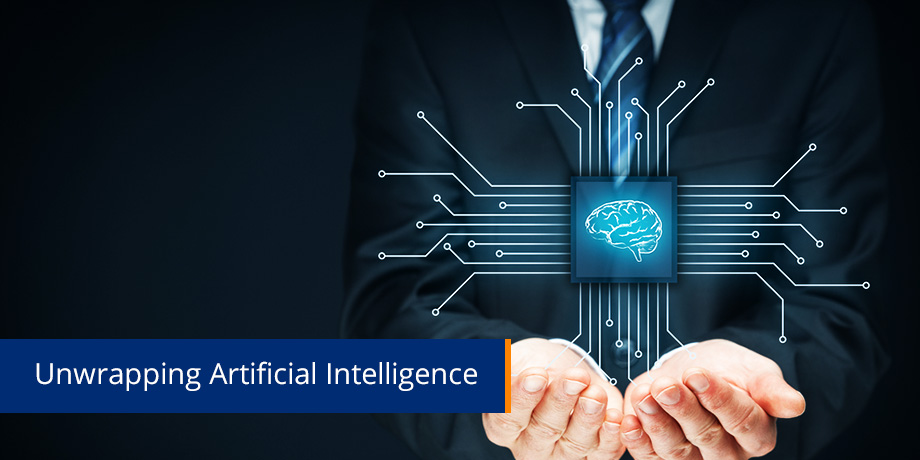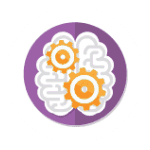
Artificial Intelligence promises to not only improve the customer experience, but also change the way businesses operate. We already use artificial intelligence in our everyday lives, possibly without being aware of it. Now is the time for organizations to investigate the role of AI in digital transformation, and consider how to leverage it to stay competitive.
These visuals provide basic information about AI to help start your organization’s journey…

Artificial Intelligence terms
Sourced from Fabernovel

Artificial Intelligence (AI)
Artificial Intelligence is the ability for computers to act without being explicitly programmed, thereby becoming capable of ‘intelligent behavior’.

Machine Learning (ML)
Enables machines to learn for themselves based on data, rather than coding a specific set of instructions.

Deep Learning (DL)
Supervised learning, which involves ‘training and testing’ a machine based on large quantities of labelled data samples.

Generative Adversarial Networks (GAN)
Unsupervised learning, in which a machine learns to create data that is similar to given data, then learn from mistakes to avoid making similar errors in the future.
Enabling Forces
There are a number of forces that are enabling the rise of AI, not least the investment into R&D by big brands such as Microsoft, Google, Facebook and Apple. Sourced from Deeplearning4J
Neural Networks
 A computer system designed to work by classifying information in the same way a human brain does
A computer system designed to work by classifying information in the same way a human brain does
Decreasing costs
 Decrease in storage, bandwidth & computing costs
Decrease in storage, bandwidth & computing costs
Processing power
 GPUs make parallel processing faster, cheaper and more powerful
GPUs make parallel processing faster, cheaper and more powerful
Big data
 Access to large amounts of data
Access to large amounts of data
Giants investing in Artificial Intelligence
Big brands are investing in machine learning platforms and providing tools that encourage the application of AI into other processes and machines. Sourced from Techworld and CBInsights









Major players
Machine Learning Platforms
Providing algorithms, APIs, development and training toolkits, data, as well as computing power to design, train, and deploy models into applications, processes and other machines. Sourced from Forbes








AI-optimized Hardware
Graphics processing units (GPU) and appliances specifically designed and architected to efficiently run AI-oriented computational jobs. Currently making a difference primarily in deep learning applications. Sourced from Forbes






Artificial Intelligence milestones

1950
Turing tests introduced by Alan Turing

1956
Dartmouth Conference: First AI Conference

1964
ELIZA: First AI based chatbot

1966
Shakey: First AI able to handle both logical reasoning and the ability to move by itself

1968
SHRDLU: Used AI to interpret the natural language of a human user

1974-1980
AI Winter: Period when AI research funding had a decrease

1996
Natural language Speech Recognition was introduced

1997
IBM’s Deep Blue beats Gary Kasparov at Chess

2005
AI based recommendation engine used by TiVo Suggestions

2009
Google’s self driving car becomes a reality

2011
IBM’s Watson beats Jeopardy champions

2011
Personal assistants like Siri & Google Now become mainstream

2012
Google’s Artificial Brain learns to find cat videos

2014
Generative Adversarial Networks first introduced

2015-2016
OpenAI in 2015. Google’s Deepmind AlphaGo defeats Go’s champion in 2016
Practical applications
AI is already powering a lot of things. With systems like Facebook’s face recognition to speech recognition & chatbots, you probably use it dozens of times a day without knowing it. Some examples of AI used today are listed below. Sourced from Forbes

Customer support
Cogito
Lucene

Smart home
Alexa
Next

Self driving
Tesla
Leaf200

Personal assistant
Siri
Google Now

Customer experience travel
Boxever
John Paul

Recommen-dations
Amazon
Netflix
Here are some more future focused applications

Cyber security
Threat detection
Threat neutralization

Disasters
Investment research
Risk management

Automotive
Deliveries
Driverless cars

Financial services
Investment research
Risk management

Healthcare

Agriculture

Manufacturing
Inventory management
Quality control

Environmental
Modeling ecological systems
Resource management
The applications of Artificial Intelligence are many, but it’s just beginning – jump ahead to 2025 and it will be the foundation of just about everything we do.
The future looks bright
Just look at the Artificial Intelligence market over the next few years …
- 2016
- 2017
- 2018
- 2019
- 2020
- 2021
- 2022
- 2023
- 2024
- 2025
Looking at the above stats, it is evident that the future of AI is indeed very bright, so if you want your business to stay competitive, then NOW is a good time to incorporate it into your digital strategy!
















